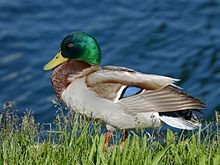Drake (male)



Drake or Drake , the male duck called.
Word origin and meaning
The first evidence of the adoption of the word from Low German can be found in Magdeburg at the end of the 15th century.
"Drake" originally comes from Flemish and means "of dark color", with which the drake was named after its feather color. Other interpretations point to a pet form of the personal names Old Saxon Erpo and Old High German Erpho , the brown, dark one, since in Low German dialects Gerd and Aleid ( Gerhard and Adelheid ) are still used today for “Gänserich” and “Gans”.
distribution
According to the digital dictionary of the German language , the word "Erpel" is a common term, especially in northern Germany, which was introduced by Dutch settlers and later widely spread through the hunter language .
Jacob and Wilhelm Grimm stated in their German dictionary (III, 937) that in some parts of Germany (as in Pomerania, Braunschweig, Niederhessen and Waldeck) the term “drakes” for all male ducks, in other parts, as in Hanover was used by the hunter only for the male wild duck .
Sources and references
- ↑ a b c drakes. In: Digital dictionary of the German language . Retrieved December 27, 2016
- ↑ Drake. In: Wissen.de - dictionary of origin. Retrieved December 27, 2016 .
- ↑ Drake. In: duden.de . Retrieved December 27, 2016 .
- ↑ Drake. In: Dudenredaktion: The dictionary of origin: Etymology of the German language (= Duden - German language in 12 volumes. Volume 7). 5th, revised edition. Bibliographisches Institut, Berlin 2015, ISBN 978-3-411-90539-3 , p. 257 ( limited preview in Google book search).
- ↑ Drake . In: Jacob Grimm , Wilhelm Grimm : German Dictionary . Hirzel, Leipzig 1854–1961 ( woerterbuchnetz.de , University of Trier).